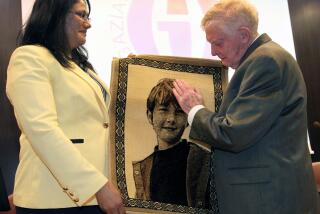Workingman, TV Figure Joined in Bond of Tragedy
- Share via
Terry Green can’t talk. He wants to, and a tracheotomy that he just had is helping him to breathe. When a doctor encourages him to try, Terry moves his lips, but the words just won’t come out.
He has been in this fix for more than a month now. Six operations have already been performed on him. Three or four more might be necessary.
He is confined to a small bed in a ward for burn victims, unable to experience the outside world’s little pleasures that others in Southern California are currently enjoying--basketball games, victory parties and such.
But he did feel enough strength Tuesday morning to give his fiancee, Lorraine, a kiss, which was a triumph in itself.
Terry Green is not a rich or famous guy. He’s just a 36-year-old workingman who was doing a routine job in Long Beach a few weeks ago when something bad happened.
He is not going to get a parade, or a proclamation from City Hall congratulating him for everything he has done. The primary thing that Terry Green and his loved ones have to celebrate today is the fact that he is still alive.
*
Electrocutions have become increasingly rare over the last 10 years, as safety precautions and technology have improved.
By a quirk of fate, however, the staff of the Sherman Oaks Hospital has had to handle three such cases in the last few months, including a well-known one involving Adrienne Alpert, the KABC-TV news reporter. Alpert lost parts of her limbs and nearly her life after nearly being electrocuted in a May 22 accident involving a microwave antenna on her TV network’s van.
Terry Green’s hospital room is the one next to hers.
He and his family have been aware of the public attention and support that Alpert has been receiving since her accident, and bear her no ill will whatsoever. They understand the nature of her situation and why so many people care.
But by virtue of being just a regular guy, never in the spotlight, Green doesn’t get paid the same kind of notice. There are no press briefings or TV mini-cam crews lined up for updates on his condition.
“We just hope that that lady gets better too, same as we do Terry,” says his mother, Loretta Stidham, seated on a terrace Tuesday morning outside the hospital’s burn unit.
Her son’s dreadful accident occurred four days before the TV reporter’s. Stidham and her husband were at home in Albuquerque, N.M., on May 18 when a call came from Lorraine, who had been living with Green in a mobile home since he came to California for a job.
Around 4 p.m. that day, Green, a lineman, had been working in a “cherry picker” elevated tower, updating electrical power lines. As best as anyone could ascertain--since Terry has been unable to speak since--he lost his balance, reached out, grabbed a power line with one hand and the rim of his cherry-picker’s well with the other hand. It caused the grounding of 12,000 electrical volts.
Green was taken to a Long Beach hospital, then airlifted to Sherman Oaks for immediate surgery.
Both arms were amputated.
“A co-worker saved his life by performing CPR,” says Dr. Peter Grossman, a reconstructive surgeon who has been treating Green since the accident. “It was probably the kind of work Terry had done 100 times without a hitch. Then your entire life changes in one second’s time.”
Subsequent procedures included the debridement of dead tissue, skin grafts and the tracheotomy, 2 1/2 weeks after the accident, that permitted Green to ease off the use of a respirator. He still faces further tissue removal and work on a muscle flap from his back that will cover exposed arteries and bone.
And aside from physical complications ranging from neurological damage to kidney failure, doctors must monitor a patient’s emotional trauma. Because accidents like these can shock a system in so many ways.
“Electricity,” Green’s mother says, “it’s so unforgiving.”
*
When his work in Long Beach was done, Terry Green and his fiancee were going to drive their trailer to Las Vegas to get married.
Now they must wait for him to talk again, walk again, work again.
Maybe it will be possible to enjoy the good things in life as before. Maybe he and the woman next door, the TV reporter, can meet soon, share their strange parallel fates, or, who knows? Maybe even keep in touch.
“That’s right,” Terry Green’s mother says, “because after all, they were neighbors once.”
*
Mike Downey’s column appears Sundays, Wednesdays and Fridays. Write to: Los Angeles Times, 202 W. 1st St., Los Angeles, CA 90012. E-mail: mike.downey@latimes.com
More to Read
The complete guide to home viewing
Get Screen Gab for everything about the TV shows and streaming movies everyone’s talking about.
You may occasionally receive promotional content from the Los Angeles Times.






